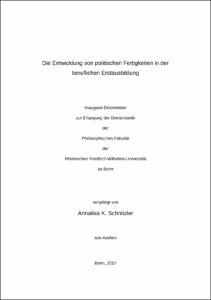Die Entwicklung von politischen Fertigkeiten in der beruflichen Erstausbildung

Die Entwicklung von politischen Fertigkeiten in der beruflichen Erstausbildung

| dc.contributor.advisor | Blickle, Gerhard | |
| dc.contributor.author | Schnitzler, Annalisa K. | |
| dc.date.accessioned | 2020-04-23T14:29:08Z | |
| dc.date.available | 2020-04-23T14:29:08Z | |
| dc.date.issued | 11.12.2017 | |
| dc.identifier.uri | https://hdl.handle.net/20.500.11811/7077 | |
| dc.description.abstract | Politische Fertigkeiten als auf den Berufskontext ausgerichtete Facette sozialer Kompetenz gelten als förderlicher Faktor für berufliche Leistung und eine erfolgreiche Karriere. Aus diesem Grund stellt die Bestimmung von Entwicklungsbedingungen für politische Fertigkeiten ein wichtiges Forschungsfeld dar. Die vorliegende Arbeit beleuchtet mit Rückgriff auf das neo-sozioanalytische Modell von Roberts (2006), die sozial-kognitive Lerntheorie (Bandura, 1979) und handlungsregulatorische Ansätze (Volpert, 1994) vier Kontextfaktoren am Ausbildungsort Betrieb im Rahmen der beruflichen Erstausbildung auf ihre förderliche Wirkung für die (Weiter-) Entwicklung von politischen Fertigkeiten. Die empirische Erhebung an 108 Auszubildenden zu Kaufleuten für Versicherungen und Finanzen zeigte, dass das Ausmaß der Interaktionsanforderungen, welche die Auszubildenden an ihrem Arbeitsplatz zu bewältigen hatten, nur dann zu einer Zunahme ihrer politischen Fertigkeiten führte, wenn die Auszubildenden viele Rollenmodelle für politisch geschicktes Verhalten hatten beobachten können. Ein hohes Maß an Feedback bei gleichzeitigem Vorliegen vieler Interaktionsanforderungen wirkte sich vermittelt über die Einstellung zu politischen Fertigkeiten ebenfalls auf die Veränderung der politischen Fertigkeiten aus. Die vermittelte Relevanz über politisch gewandtes Verhalten zeigte hingegen keinen Effekt. Die Ergebnisse der Studie unterstreichen die grundsätzliche Förderbarkeit von politischen Fertigkeiten durch die Gestaltung einer anregenden Arbeitsumgebung, zumindest für die Phase der beruflichen Erstausbildung. Die theoretischen und praktischen Implikationen der Ergebnisse werden erörtert, die Stärken und Grenzen der Arbeit diskutiert und der zukünftige Forschungsbedarf identifiziert. | en |
| dc.description.abstract | The development of political skill in initial vocational training Political skill as a facet of social competence targeted at the professional context is reckoned a beneficial factor for professional performance and a successful career. For this reason, the determination of developmental conditions for political skill represents an important area of research. This contribution highlights four context factors in training companies in the context of initial vocational education and training concerning their fostering impact on the development and advancement of political skill by drawing on Roberts' (2006) neo-socioanalytic model, the social-cognitive theory of learning (Bandura, 1979) and approaches from action regulation theory (Volpert, 1994). The empirical assessment of 108 apprentices training to become insurance and financial services brokers revealed that the extent of interaction demands which the apprentices had to master at their workplace only contributed to an increase in political skill, if the apprentices had had the opportunity to observe many role models performing politically skilled behaviour. A high extent of feedback while simultaneously being confronted with many interaction demands also affected the change in political skill via the individual attitude towards political skill. Conveying the relevance of politically skilled behaviour to apprentices, in contrast, did not show any effect. The results of this study emphasize the general susceptibility of political skill to the fostering influences of a stimulating work environment, at least at the stage of initial vocational training. Theoretical and practical implications of the results are debated, strengths and limitations of the contribution are discussed and the need for future research is identified. | en |
| dc.language.iso | deu | |
| dc.rights | In Copyright | |
| dc.rights.uri | http://rightsstatements.org/vocab/InC/1.0/ | |
| dc.subject | politische Fertigkeiten | |
| dc.subject | neo-sozioanalytisches Modell | |
| dc.subject | Modelllernen | |
| dc.subject | Rollenmodelle | |
| dc.subject | sozial-kognitive Theorie | |
| dc.subject | Handlungsregulation | |
| dc.subject | Enterprising-Arbeitsumwelt | |
| dc.subject | berufliche Sozialisation | |
| dc.subject | Auszubildender | |
| dc.subject | political skill | |
| dc.subject | neo-socioanalytic model | |
| dc.subject | vicarious learning | |
| dc.subject | role models | |
| dc.subject | social-cognitive theory | |
| dc.subject | action regulation theory | |
| dc.subject | Enterprising work environment | |
| dc.subject | occupational socialization | |
| dc.subject | apprentice | |
| dc.subject.ddc | 150 Psychologie | |
| dc.title | Die Entwicklung von politischen Fertigkeiten in der beruflichen Erstausbildung | |
| dc.type | Dissertation oder Habilitation | |
| dc.publisher.name | Universitäts- und Landesbibliothek Bonn | |
| dc.publisher.location | Bonn | |
| dc.rights.accessRights | openAccess | |
| dc.identifier.urn | https://nbn-resolving.org/urn:nbn:de:hbz:5-49206 | |
| ulbbn.pubtype | Erstveröffentlichung | |
| ulbbnediss.affiliation.name | Rheinische Friedrich-Wilhelms-Universität Bonn | |
| ulbbnediss.affiliation.location | Bonn | |
| ulbbnediss.thesis.level | Dissertation | |
| ulbbnediss.dissID | 4920 | |
| ulbbnediss.date.accepted | 01.09.2017 | |
| ulbbnediss.institute | Philosophische Fakultät : Institut für Psychologie | |
| ulbbnediss.fakultaet | Philosophische Fakultät | |
| dc.contributor.coReferee | Neubauer, Walter |
Dateien zu dieser Ressource
Das Dokument erscheint in:
-
E-Dissertationen (713)




